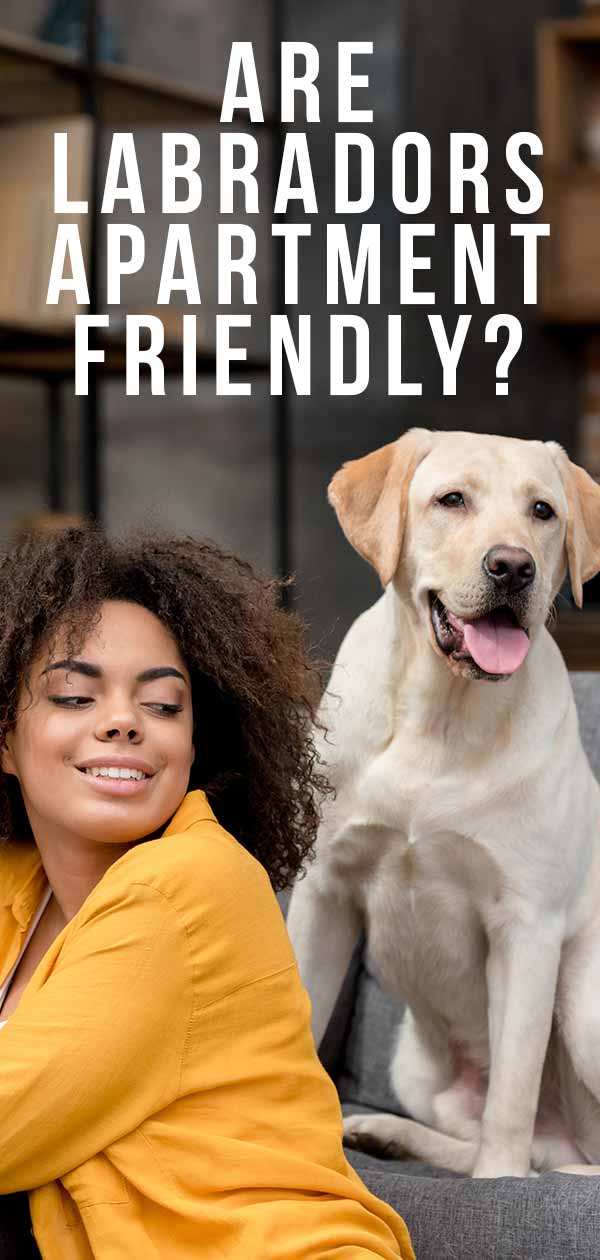Are Labradors apartment friendly or not? Labradors can live happily in some apartments, but there are things to bear in mind.
They are prone to hip and elbow dysplasia, which is likely to be made worse by regularly climbing up and down lots of stairs.
And they need lots of exercise, so owners need to consider how this will be achieved.
The Appeal of a Lab
Labrador Retrievers are America’s most popular dog breed, according to the American Kennel Club. In fact, the breed has held that number one spot since 1991!
They’re outgoing and easygoing, as well as intelligent and loyal.
All around, Labrador Retrievers are excellent companions with a loveable personality.
But what if you live in an apartment? Can this mid- to large-sized dog handle apartment living?
Let’s dive in and see how America’s favorite dog fits into this lifestyle.
Do Labrador Retrievers Need a Lot of Space?
An adult Labrador is medium-to large-sized. They will stand about 21 to 24.5 inches tall and weigh 55 to 80 pounds.
While they’re not the largest type of dog, a studio-sized apartment might get quite cramped.
However, a decently sized apartment can accommodate a Labrador.
Be aware that you will need to make up for a lack of living space with a lot of time outdoors! Exercise and play will be much more important to a Labrador than the amount of living space they have.
Can Labrador Retrievers Climb Stairs?
A ground floor apartment is the safest choice for a Labrador Retriever.
Using stairs several times a day increases the likelihood of joint problems that the Labrador Retriever breed is prone to, such as hip and elbow dysplasia.
These conditions cause instability in the hip and/or elbow joints, leading to excessive wear on the joints’ cartilage. Cartilage damage or loss can lead to the development of arthritis in these joints and can be very painful.
Hip and elbow dysplasia can be inherited genetically, so responsible breeders should screen parents for this condition.
Hip and elbow dysplasia can also be caused by excess weight, which Labrador Retrievers are unfortunately also prone to as well.
If your apartment is on a higher floor and your only access to it is stairs, definitely reconsider choosing a Labrador as your companion.
If you’re lucky enough to have an elevator in your apartment complex, living on a higher floor with a Labrador Retriever will be ok!
Do Labradors Need a Back Yard?
Technically speaking, a Labrador Retriever does not require a backyard in your home if (and only if) you have a dog park or something similar nearby.
The Labrador breed is very energetic and needs a ton of exercise. Multiple walks a day are ideal, and space to run and play will expend all of that pent-up Labrador energy.
At the minimum, a Labrador should get at least two 30-minute walks each day.
If your Labrador does not have space to expend energy, it can get bored. And boredom with a Labrador can lead to destructive behavior, such as chewing your household items.
Be sure to locate the closest dog park or other area near your apartment where your Labrador can have some off-leash play time!
Are Labradors Apartment Friendly?
As an apartment resident, the first thing you’ll want to check before choosing a Labrador is if your complex even allows pets.
If dogs are allowed, some apartments may charge a deposit and/or monthly pet fee. In addition, some apartments might have size limits on the type of dog allowed to live in your apartment.
If a Labrador fits in all of the potential requirements to be an official resident of your apartment, you’ll want to check out a few more things.
Do your neighbors have dogs? Kids? It’s important to know what is around your Labrador’s space, mostly because they can get excited and may run or jump on potential friends.
Is there a grassy area for quick bathroom breaks? If you don’t have time for a full walk but your Labrador needs an emergency potty break, grassy areas around your apartment are definitely helpful.
You’ll need to make sure to clean up after your Labrador if you use any potty spots in the apartment area. You certainly don’t want to upset your neighbors!
Are you close to a busy street? A well-trained Labrador shouldn’t run away from you, but it is always best to remain cautious.
Noise and Apartment Living
Many apartments share one or more walls with neighbors.
While generally not considered a barking breed, a Labrador may bark a lot when bored.
You’ll definitely want to warn your apartment neighbors and work with your Labrador to teach it appropriate barking situations.
If you are gone for long stretches of time, a Labrador may experience separation anxiety. This can also lead to destructive chewing and more barking.
Raising a puppy in an apartment presents its own set of challenges.
You’ll need to go in and out a lot during the early potty-training stages. This might be risky for a Labrador Retriever puppy’s growing joints.
Puppies may bark, whine, and howl until they learn the proper situations in which that is acceptable (if at all!).
As you train and socialize your puppy, you’ll see less of this behavior. But, it’s not a bad idea to warn close neighbors about your little companion so they don’t worry.
Can a Labrador Retriever Live in an Apartment?
Are Labradors apartment friendly? A Labrador Retriever can certainly live in an apartment, if you’re able to provide the outdoor exercise and play it needs.
The smaller size or lack of backyard space of most apartments shouldn’t hinder you from choosing a Labrador as a companion.
What you should consider more than home size is your personal commitment to the high energy and exercise requirements of this loveable and fun breed.
Tips to Making Apartment Life Work with a Labrador
Living in an apartment with a Labrador does come with some stipulations. Here are a few suggestions to make apartment life easier for you and your Lab:
- Choose a ground floor apartment to avoid excess joint strain from frequently going up and down stairs.
- Crate train your Labrador from an early age to prevent destructive behavior and potty accidents. It may also help you Labrador feel more secure if they tend to get separation anxiety.
- Hire a dog walker to visit your Labrador throughout your workday.
- Take your Labrador to day care. Yes, day care exists for dogs! It’s an excellent option if you spend most of your day away from home.
- Adjust your schedule to meet your Labrador’s needs. You may need to wake up earlier in order to get some exercise and play in. Do what you need to do in order to burn some of your Labrador’s energy!
We hope we’ve answered your questions around “are Labradors apartment friendly or not”? Please let us know in the comments if you have further questions!
References and Resources
- “Canine Hip Dysplasia.” American College of Veterinary Surgeons.
- Ricks, Brian. “Yes, Retrievers Can Live in Apartments.” Easy Retriever Training, 2018.
- Smith, Gail K. VMD. et al. “Evaluation of risk factors for degenerative joint disease associated with hip dysplasia in German Shepherd Dogs, Golden Retrievers, Labrador Retrievers, and Rottweilers.” Journal of the American Veterinary Medical Association, 2001.
The Labrador Site Founder
Pippa Mattinson is the best selling author of The Happy Puppy Handbook, the Labrador Handbook, Choosing The Perfect Puppy, and Total Recall.
She is also the founder of the Gundog Trust and the Dogsnet Online Training Program
Pippa's online training courses were launched in 2019 and you can find the latest course dates on the Dogsnet website




















“21 to 24.5 feet tall”
Can’t imagine cleaning that poop out of your apartment XD.